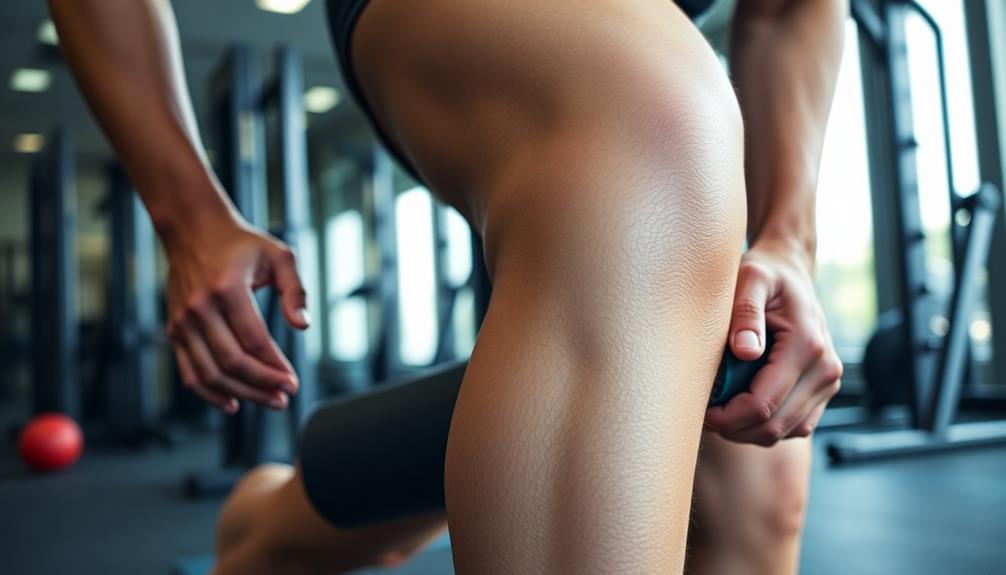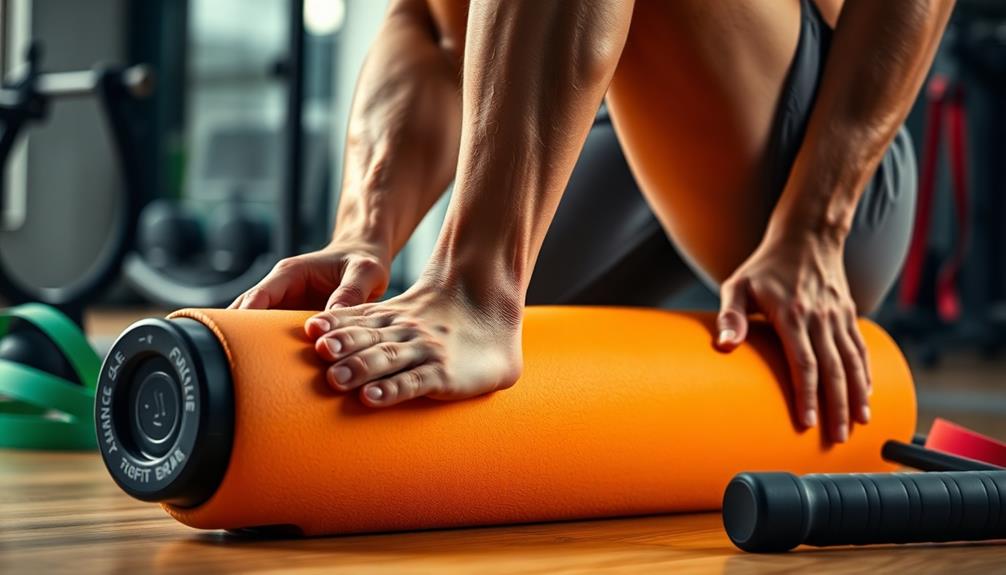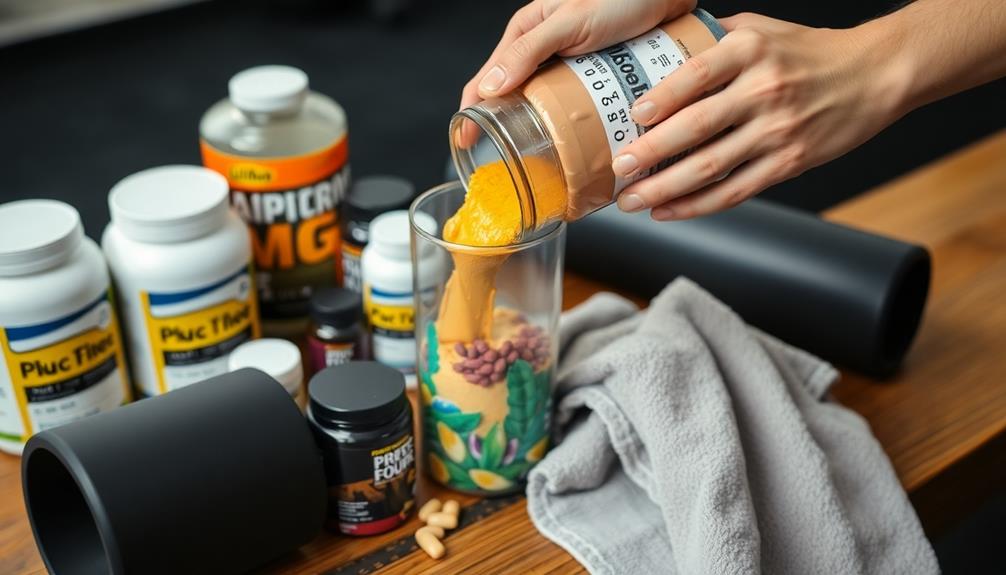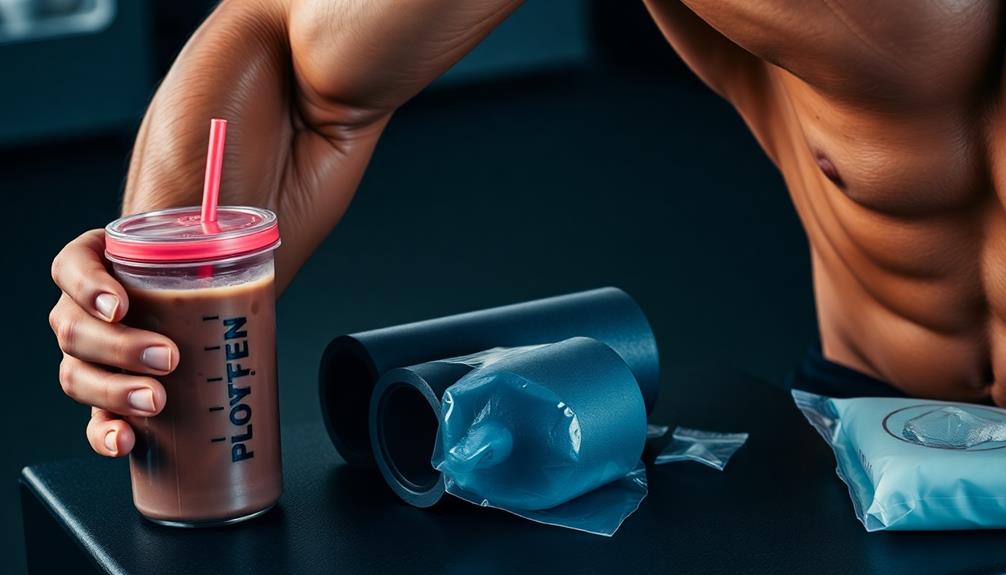To optimize muscle repair after strength training, focus on proper nutrition, hydration, and rest. Consume protein and carbs within an hour post-workout, and stay well-hydrated. Prioritize quality sleep, aiming for 7-9 hours nightly. Incorporate active recovery techniques like light exercises or stretching on rest days. Use foam rolling to ease muscle tension and improve flexibility. Apply ice for immediate pain relief or heat for older injuries. Don't forget to take rest days to allow your muscles to rebuild and strengthen. By following these practices, you'll support your body's natural healing processes and prepare for future workouts. There's more to explore about maximizing your recovery routine.
Core Insight
- Consume 20-30 grams of protein and quick-digesting carbs within an hour after exercise for optimal recovery.
- Hydrate adequately with water or electrolyte drinks to replace lost fluids and support nutrient transport.
- Get 7-9 hours of quality sleep nightly to allow for muscle repair and growth.
- Engage in active recovery techniques like light walking or yoga to promote blood flow and reduce muscle stiffness.
- Use foam rolling and stretching to increase flexibility, reduce soreness, and improve range of motion.
Proper Post-Workout Nutrition

After a good workout, your body needs the right fuel to help your muscles recover and grow. To get the most out of your training, eat a mix of protein and carbs within an hour after you finish exercising. Protein helps repair and build muscle, so aim for 20-30 grams from sources like whey powder, chicken, or Greek yogurt. Carbs are important too – they refill your energy stores and shuttle nutrients to your muscles. Grab a quick-digesting carb source like fruit, rice, or sweet potatoes.
And don't forget to drink up! Water or a drink with electrolytes will help you rehydrate and get those nutrients where they need to go. By making post-workout nutrition a priority, you'll bounce back better and get the full benefits of all your hard work in the gym.
Adequate Hydration

Drinking enough water is crucial for muscle repair and recovery after a workout. When you exercise, your body loses fluids through sweat. It's important to replace these fluids by drinking water before, during, and after your workout. Try to drink 16-20 ounces of water within two hours after strength training. Using hydration powders can help replenish electrolytes and support muscle recovery.
Don't wait until you're thirsty to drink water, as thirst is a sign that you're already dehydrated. Always keep a water bottle with you and take frequent sips throughout the day. If you've had an intense workout or exercised in hot weather, you may need to replace electrolytes as well. Drinking a sports beverage or adding electrolyte tablets to your water can help you stay properly hydrated and support muscle recovery.
Quality Sleep and Rest

Getting enough sleep and rest is crucial for muscle recovery after strength training. While you sleep, your body makes growth hormone, which helps your muscles heal and grow. Try to get 7-9 hours of unbroken sleep every night for the best results. To sleep better, think about taking natural sleep aids that can help you unwind and doze off more quickly, leading to improved muscle recovery.
Rest days matter just as much. They give your muscles a chance to rebuild and get stronger. Take at least one or two rest days each week. On those days, do easy things like walking or stretching to boost blood flow and loosen stiff muscles.
Stick to a regular sleep schedule and calming pre-bed routine. Stay away from screens before bed, make your room dark and cool, and use comfy bedding. If you have trouble sleeping, try natural remedies like chamomile tea or meditation. Keep in mind, getting enough rest is just as important as your workouts for reaching your fitness goals.
Active Recovery Techniques

Rest days matter, but active recovery can also help your muscles heal after strength training. Low-intensity exercise promotes blood flow and eases soreness. Try these active recovery ideas:
| Activity | Benefits |
|---|---|
| Easy walking | Boosts circulation |
| Simple yoga | Improves flexibility |
| Swimming | Easy on the joints |
| Foam rolling | Relaxes tense muscles |
These moves clear out waste and bring nutrients to your muscles so you recover faster. They keep you mobile and prevent stiffness too. Keep it light – you shouldn't feel worn out after active recovery. Aim for 20-30 minutes on rest days or between tough workouts. Active recovery supports your body's natural healing and gets you ready to lift again.
Foam Rolling and Stretching

Foam rolling and stretching are important parts of your post-workout recovery. They help relax tense muscles, make you more flexible, and lower your chance of getting hurt. When you do these things after strength training, you'll notice:
- More blood flow to your muscles
- Less muscle soreness
- Better range of motion
- Faster muscle recovery
- Improved overall performance
For even better muscle relief, try using a heating pad along with foam rolling and stretching. The heat can relax tight muscles and help them heal.
To get the most out of foam rolling, focus on areas that feel tight or sore. Roll slowly over each muscle for 30-60 seconds, pausing on tender spots. After that, do some gentle stretching. Hold each stretch for 15-30 seconds without bouncing. Remember to breathe deeply and relax into the stretches. If you regularly foam roll and stretch after working out, your muscles will recover faster and stay flexible in the long run.
Ice and Heat Therapy

Ice and heat are two simple ways to help your muscles feel better after working out. Ice helps with swelling and pain right after you exercise or get hurt. Heat is better for older injuries that still bother you. It gets more blood to the area and relaxes tight muscles.
To use ice, put a cold pack on the sore spot for 15-20 minutes. Make sure there's something between the ice and your skin, like a thin towel. For heat, try a heating pad or warm bath for 15-30 minutes.
Just remember, don't use heat on a new injury – that can make swelling worse. And if you're not sure what to do, it's always best to check with a doctor or trainer first. They can help you figure out the best way to feel better fast.
Supplements for Muscle Recovery

Many athletes rely on good nutrition and rest to recover after exercise, but some supplements can help repair muscles after strength training. While there are many options available, some work better than others. Protein powders with lots of BCAAs are especially good for building muscle protein and recovery. Five supplements that may help with muscle recovery are:
- Whey protein
- Creatine
- BCAAs (Branched-Chain Amino Acids)
- L-Glutamine
- Omega-3 fatty acids
When choosing supplements, it's important to pick high-quality products from trusted brands. Start with one supplement at a time to see how well it works for you. Keep in mind that supplements don't replace a healthy diet and enough rest. They should be used along with your current recovery plan. Before adding new supplements to your routine, talk to a doctor or nutritionist, especially if you have any health problems or take medications.
Frequently Asked Questions
How Long Does It Take for Muscles to Fully Recover After Strength Training?
You'll typically need 24-72 hours for your muscles to fully recover after strength training. It varies based on workout intensity, your fitness level, and individual factors. Proper rest, nutrition, and sleep can speed up the process.
Can I Do Strength Training Every Day if I Focus on Different Muscle Groups?
You can strength train daily if you target different muscle groups. It's a smart approach to give each group time to recover. However, don't forget to include rest days for overall recovery and to prevent overtraining.
Are There Specific Clothing or Compression Garments That Aid in Muscle Recovery?
Yes, compression garments can aid in muscle recovery. You'll find compression sleeves, socks, and full-body suits that may help reduce muscle soreness and inflammation. They're designed to increase blood flow and support your muscles post-workout.
How Does Age Affect Muscle Recovery Time and What Adjustments Should Older Adults Make?
As you age, your muscle recovery time increases. You'll need more rest between workouts. Adjust by reducing training frequency, increasing sleep, focusing on proper nutrition, and incorporating low-impact activities. Don't forget to warm up thoroughly before exercising.
Can Certain Medications Interfere With Muscle Repair and Recovery After Strength Training?
Yes, certain medications can interfere with muscle repair and recovery. You'll want to be cautious with NSAIDs, statins, and some antibiotics. They can slow healing or increase muscle damage. Always consult your doctor about potential interactions with your workout routine.

